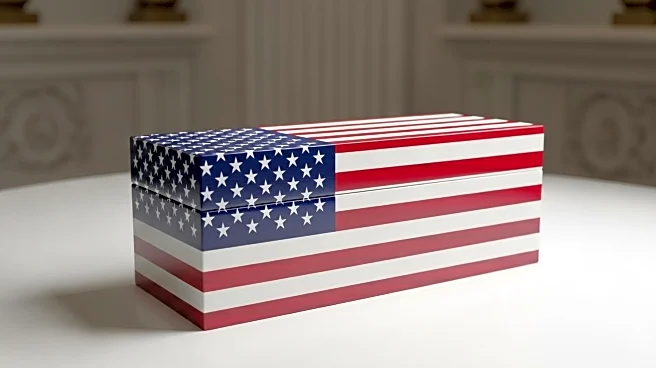What's Happening?
During a recent visit to the White House, Polish President Karol Nawrocki and his delegation received a variety of gifts from President Trump, including Make America Great Again hats and white paper bags bearing Trump's signature. The most notable item was a large printout of the two leaders smiling in the Oval Office, accompanied by a message from Trump stating, 'You will win.' Trump also signed the poster with a personal note to Nawrocki, expressing confidence in his presidency. Nawrocki, who was recently sworn in as Poland's president, has been a supporter of Trump and received backing from U.S. officials during his campaign. The visit also included discussions on security concerns related to Russia's actions in Ukraine, with Trump pledging continued support for Poland.
Why It's Important?
The exchange of gifts and the personal endorsement from President Trump highlight the strengthening of U.S.-Poland relations, particularly in the context of security concerns in Eastern Europe. Trump's support for Nawrocki, a conservative leader, underscores the alignment of political ideologies between the two administrations. The gifting of MAGA merchandise signifies the global reach of Trump's political brand and its influence beyond U.S. borders. This development may impact international perceptions of U.S. foreign policy and its alliances, particularly among conservative governments.
What's Next?
The visit may lead to further diplomatic engagements between the U.S. and Poland, focusing on security cooperation and military support. As Poland navigates its geopolitical challenges, the backing from the U.S. could play a crucial role in shaping its foreign policy strategies. The symbolic gesture of gifting MAGA merchandise may also encourage other conservative leaders to seek closer ties with the Trump administration, potentially influencing global political dynamics.
Beyond the Headlines
The gifting of MAGA merchandise to foreign leaders raises questions about the intersection of political branding and diplomacy. It reflects the cultural export of American political movements and their impact on international relations. This approach may set a precedent for how political leaders use personal branding to foster alliances and influence global politics.










